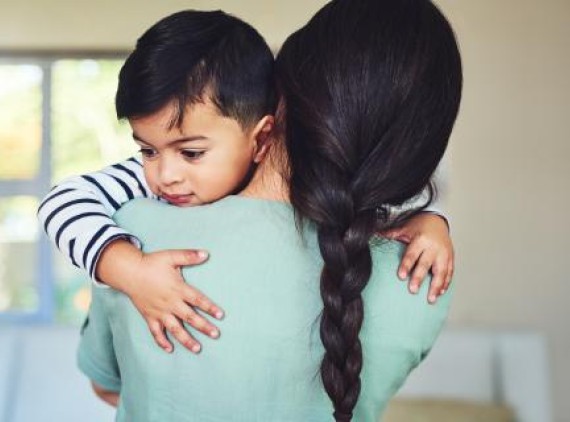Anxiety-related conditions among children and young adults are on the rise. Dr. Chelsea Tobin is a pediatric psychologist at Phoenix Children’s. Here, she answers common questions about anxiety in children. She also offers tips on how parents can help kids cope with anxiety.
What is anxiety, in a nutshell?
Anxiety is the reaction of our body and mind when we experience something dangerous or unfamiliar. This can also happen when we experience something that causes us stress. A small amount of anxiety can help children stay aware. But for some kids, they have so much anxiety that it interferes with their daily life.
Two of the most common types of anxiety in kids are:
Separation anxiety
A child who has separation anxiety can be anxious and upset when they say goodbye to their caregiver. He may worry something bad will happen to him or his parent if they are apart. He could refuse to go to camp or a play date at a friend's house.
Social anxiety
Children with social anxiety may have a strong fear of social situations. They may fear someone will judge or humiliate them.
What are the symptoms of social anxiety in kids?
When asked to perform in front of or be around others, children with social anxiety disorder may:
- Blush, sweat or tremble
- Feel lightheaded
- Feel very self-conscious
- Have a rapid heart rate and shortness of breath
- Feel their “mind going blank”
- Feel sick to their stomach
- Have a rigid body posture
- Speak with a very soft voice
- Avoid places where there are other people
- Find it difficult to make eye contact and talk to people in social situations
Some children are more introverted and shy, and others are more outgoing. Everyday nerves are different than social anxiety. If a child has social anxiety disorder, it means his or her anxiety is high enough that it disrupts their relationships, daily routines, school day and/or other activities.
What are the symptoms of separation anxiety in kids?
Separation anxiety means kids may struggle with being away from their caregivers. They could also worry about being away from the "bubble" they built during the pandemic. Symptoms may include:
Being more "clingy" around their guardian, and crying or having nightmares about being away from that person
- Acting out as the time for a separation gets closer
- Describing feeling afraid that something bad may happen to their attachment figure
- Disturbances in sleep and experiencing nightmares
- Less interest is activities they used to enjoy
- Worsening grades at school and concentration ability for older kids and teens
- Regressing mannerisms such as bed wetting is a common issue for children after 5 years old
- Changes in weight or eating behaviors
How can you help your child cope with anxiety?
Parents can help their children cope with anxiety by using cognitive reframing. This could mean talking with their child about the reason behind their fear. Do they fear something bad will happen? What are the thoughts causing them anxiety?
This can help your child build a sense of freedom. It can also help them when fears are irrational and replace the fear with more positive thoughts. Labeling and distancing anxiety can help your child learn to be the boss of it.
Parents and caregivers can help children cope with separation anxiety by sticking to a routine. If a parent says they will pick their child up from school at 3 p.m. and they are on time, their child will be reassured. Be honest with your child and tell them plans may change. Give them updates when you can and tell them when you will be gone for longer than expected.
Before a separation, pair the experience with a reward or something your child likes. Let them pick their outfit for the day or be in charge of what music plays in the car on the way to school.
Help toddlers cope with separation anxiety by encouraging them to build independence. For example, if your child wakes up from a nap and is playing in their crib, do not rush into their room. Let them experience the feeling of having fun on their own. This will boost their confidence and independence.
For an older adolescent, acknowledge their fear and let them know you’re there for them. Instead of forcing them to do something they are anxious about, gently encourage them.
If a child senses their attachment figure is anxious, they are more likely to feel anxious too. Coping with your own anxiety about separation is important during this time. Practice coping strategies such as deep breathing and guided imagery.
Most often, anxiety disorders are treated with cognitive behavioral therapy (CBT). CBT is a type of talk therapy that helps families and children learn to manage anxiety. CBT teaches kids that what they think and do affects how they feel. They learn that when they avoid what they fear, the fear stays strong. When they face a fear, the fear gets weak and goes away.

